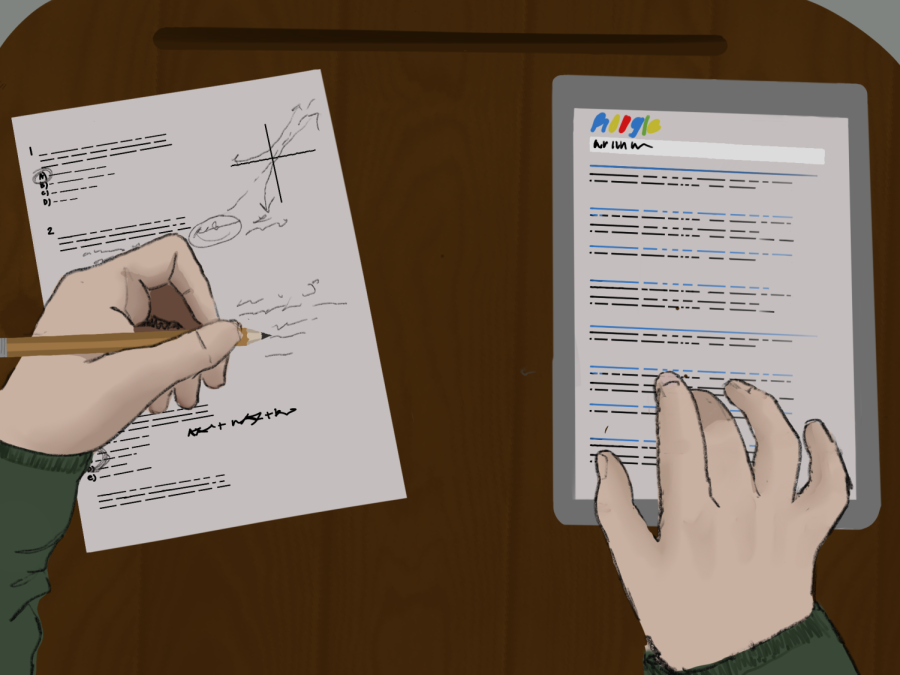Teachers concerned about various types of cheating
Torresarpi
The use of new technology has made cheating easier, and teachers have been observing a lot of cheating in class
Smart watches, Chat GPT, and Google are all tools that have made cheating easier. Teachers across departments have noticed cheating during tests, assignments, and exams.
English teacher Eric Stewart has noticed an increase in the number of students cheating since the hybrid learning environment during Covid-19.
He mentions paraphrasing as a common mistake that he sees in his students’ writing. During the remote environment, for example, it was difficult for students to learn how to cite quotations properly.
“I have noticed instances of people just really being lazy and it doesn’t matter if you didn’t get it or you’re not sure what’s going on. If you take somebody else’s words, it’s cheating,” said Stewart.
Teachers have had growing concerns in their students using artificial intelligence software systems in order to problem-solve and write essays.
Stewart did an experiment with one of his English classes involving ChatGPT. After handing back a paper, he instructed one of his students to enter the assigned prompt into this artificial intelligence system for the whole class to observe.
“We projected the response that the AI generated in half a second, and we pointed out the sorts of things that it did right, but then we pointed out all the holes in it that we can tell,” said Stewart.
This served as a useful way to show students how these computer generated responses are not reliable and can provide inaccurate information.
Stewart mentioned his fear for students attending college who occasionally resort to cheating throughout their middle and high school education.
“They’re either gonna get caught and in trouble for cheating, or they’re gonna get caught because they know nothing, because they’ve been cheating,” said Stewart.
The English department chair, Edward Zwirner, has seen it all. He catches students cheating once a week whether it is someone looking at a neighbor’s paper, copying something off the internet, or using Spark Notes and LitCharts. Before break, he recalls that there was a chatbot written piece caught by teachers.
“Generally, it’s fairly obvious that something is not someone’s work because it doesn’t sound like them. We know what your work sounds like as English teachers and what your unique voice is,” said Zwirner.
Students who violate the academic integrity policy receive consequences from the advisor chair depending on the severity of the violation.
“Most often the most minimal consequences are a Saturday school or a zero on the assignment,” said Zwirner.
Math Teacher David Wisner typically observes cheating every single assessment as he walks around the room.
“If I do see someone who’s persistently looking at someone else’s paper, I might make a general statement about how it is independent work and to make sure that you’re looking down at your paper and not around the classroom,” said Wisner.
Wisner said that he has seen other forms of cheating where two or three students have the exact same wrong answer on their test that is not seen anywhere else.
He mentioned that he will go to the advisor chair occasionally to share his proof if he detects any sort of cheating in his students’ work.
“I did have a number of situations that I had to address during remote learning, but I don’t think it’s as bad as it was. During that time, it was just all our students working together on assessments,” said Wisner.
Junior Nora Rolison hears of students cheating consistently and thinks that it can depend on how well the teacher regulates the test.
“Science teachers will sometimes let you take tests at your table and students can kind of look and see what other people are doing. Sometimes the teacher seems like they know that people are cheating and they really don’t care that much,” said Rolison.
Junior Alina Patel mentions that many students rely on cheating for the benefit of an assignment being “easier,” when really this is hurting you in the long run.
“Especially for finals, and if you want to do something in college, cheating on tests is actually worse for you because then you’re not making sure that you know the topic as well as you should,” said Patel.
Rolison thinks that cheating can also occur because of one’s lack of confidence in their answers.
“I think it has to do with just wanting to do well and making sure that you don’t mess up,” said Rolison.
With new advancements in technology and artificial intelligence playing a huge role in our society today, we can only hope that cheating stops.
“I always think I know the reasons why students go out and shortcut things, but I’m curious what students’ reasoning is behind why they do it,” said Zwirner.








































